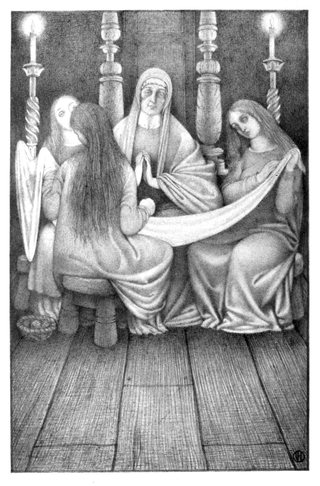
"Lord Randall", or "Lord Randal", is an Anglo-Scottish border ballad consisting of dialogue between a young Lord and his mother. Similar ballads can be found across Europe in many languages, including Danish, German, Magyar, Irish, Swedish, and Wendish. Italian variants are usually titled "L'avvelenato" or "Il testamento dell'avvelenato", the earliest known version being a 1629 setting by Camillo il Bianchino, in Verona. Under the title "Croodlin Doo" Robert Chambers published a version in his "Scottish Ballads" (1829) page 324.

"Matty Groves", also known as "Little Musgrave and Lady Barnard" or "Little Musgrave", is a ballad probably originating in Northern England that describes an adulterous tryst between a young man and a noblewoman that is ended when the woman's husband discovers and kills them. It is listed as Child ballad number 81 and number 52 in the Roud Folk Song Index. This song exists in many textual variants and has several variant names. The song dates to at least 1613, and under the title Little Musgrave and Lady Barnard is one of the Child ballads collected by 19th-century American scholar Francis James Child.

"The Raggle Taggle Gypsy" (Roud 1, Child 200), is a traditional folk song that originated as a Scottish border ballad, and has been popular throughout Britain, Ireland and North America. It concerns a rich lady who runs off to join the gypsies (or one gypsy). Common alternative names are "Gypsy Davy", "The Raggle Taggle Gypsies O", "The Gypsy Laddie(s)", "Black Jack David" (or "Davy") and "Seven Yellow Gypsies".
"Captain Wedderburn's Courtship" is an old Scottish ballad dating from 1785 or earlier. It is Child Ballad #46, Roud 36. It is known by a number of titles, including "Lord Roslin's Daughter" and "The Laird of Rosslyn's Daughter".
John Strachan (1875–1958) was a Scottish farmer and Traditional singer of Bothy Ballads including several old and influential versions of the famous Child Ballads. He had a huge repertoire of traditional songs, and was recorded by the likes of James Madison Carpenter, Alan Lomax and Hamish Henderson.
"Lady Isabel and the Elf Knight" is the English common name representative of a very large class of European ballads.
"Young Beichan", also known as "Lord Bateman", "Lord Bakeman", "Lord Baker", "Young Bicham" and "Young Bekie", is a traditional folk ballad categorised as Child ballad 53 and Roud 40. The earliest versions date from the late 18th century, but it is probably older, with clear parallels in ballads and folktales across Europe. The song was popular as a broadside ballad in the nineteenth century, and survived well into the twentieth century in the oral tradition in rural areas of most English speaking parts of the world, particularly in England, Scotland and Appalachia.

"Lord Thomas and Fair Annet", also known as "Lord Thomas and Fair Eleanor", is an English folk ballad.
"The Fair Flower of Northumberland" is a folk ballad.
"The Broomfield Hill", "The Broomfield Wager" "The Merry Broomfield", "The Green Broomfield", "A Wager, a Wager", or "The West Country Wager" (Child 43, Roud 34) is a traditional English folk ballad.
"The Bonny Hind" is a traditional English-language folk song.
"Earl Brand" is a pseudo-historical English ballad.
"The Cruel Brother" is a folk song.
"Babylon", also called "The Bonnie Banks o' Fordie" or "The Banks o' Airdrie" is an English-language folk song.
Mr. Motherwell gives a version under the title of Babylon; or, the Bonny Banks o' Fordie; and Mr. Kinloch gives another under the title of The Duke of Perth's Three Daughters. Previous editors have attempted to find a local habitation for this tradition, and have associated it with the family of Drummond, of Perth. As a legend exactly similar is current in Denmark, this appears a bootless quest.
Willie's Fatal Visit is an English-language folk song, most likely originating in Scotland.

"The Twa Brothers" is a traditional ballad existing in many variants.
Lord Thomas Stuart is an Anglo-Scottish border ballad.

"The Dowie Dens o Yarrow", also known as "The Braes of Yarrow" or simply "Yarrow", is a Scottish border ballad. It has many variants and it has been printed as a broadside, as well as published in song collections. It is considered to be a folk standard, and many different singers have performed and recorded it.
The (Bonnie) Rantin' Laddie or Lord Aboyne is a traditional Scottish folk ballad telling of the valiant rescue of his lover by a noble Highland lord.
Lord William, Sweet William or Lord Lundy is a traditional Scottish folk ballad telling how a pair of lovers, William and Janet, outwit her father, her bethrothed and the priest in order to marry one other.





